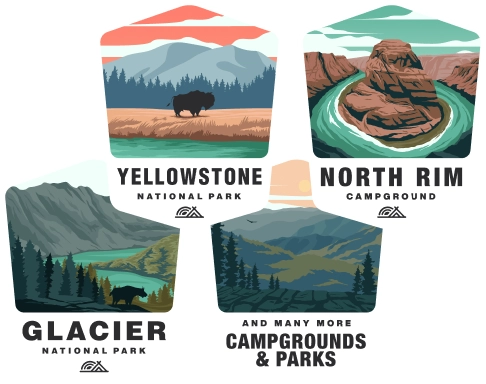Camping at Custer Gallatin National Forest
Overview of Custer Gallatin National Forest
Custer Gallatin National Forest is a vast area that stretches across southern Montana and into northeastern Wyoming. With landscapes ranging from rugged mountain peaks to rolling hills and meadows, it is an attractive destination for outdoor enthusiasts. The forest is recognized for its natural beauty, outdoor recreation opportunities, and abundant wildlife.
Camping Information
Where to Camp:
- developed campgrounds
- backcountry sites for those seeking a more rugged experience
Camping Regulations:
- Stay Limit: There is generally a 16 consecutive day stay limit at any one campground.
- Campfire: Make sure to use designated fire rings, pits, or stoves, and always check current fire restrictions.
- Bears: The forest is bear habitat, so proper food storage is crucial to minimize bear encounters.
- Leave No Trace: Visitors are expected to follow Leave No Trace principles to preserve the natural environment.
Seasons and Accessibility:
- Most campgrounds are open from late spring to early fall.
- Road access can depend on weather conditions, especially during winter months.
Reservations and Fees:
- Campgrounds may have a fee, and some sites can be reserved in advance, while others are first-come, first-served.
- Backcountry camping may be free, but some areas might require a permit.
Recreation Opportunities
- Hiking: Numerous trails ranging from easy walks to challenging backcountry treks.
- Fishing: The rivers and lakes offer trout and other freshwater species.
- Wildlife Viewing: Habitats for species like elk, deer, and possibly grizzly and black bears.
- Horseback Riding: Some trails are open to horses.
- Winter Sports: Cross-country skiing, snowshoeing, and snowmobiling in designated areas.
Safety and Preparedness
- Weather: Be prepared for sudden weather changes and dress in layers.
- Altitude: Some areas are at high elevation. Acclimate and stay hydrated to avoid altitude sickness.
- Navigation: Maps, compass, or GPS should be carried as many areas may not have mobile reception.
- Wildlife: Know how to store food and react to wildlife encounters.
Essential Resources
- Forest Service: Check with the Forest Service for detailed maps and the latest trail conditions.
- Local Regulations: Familiarize yourself with local regulations before setting out.
- Emergency Plan: Have a plan for medical or weather-related emergencies.
Conclusion: Custer Gallatin National Forest offers a diverse camping experience ranging from convenient campgrounds to remote wilderness sites. Campers should be well-informed about the regulations, prepared for a variety of conditions, and ready to practice Leave No Trace principles to ensure a safe and enjoyable visit.

